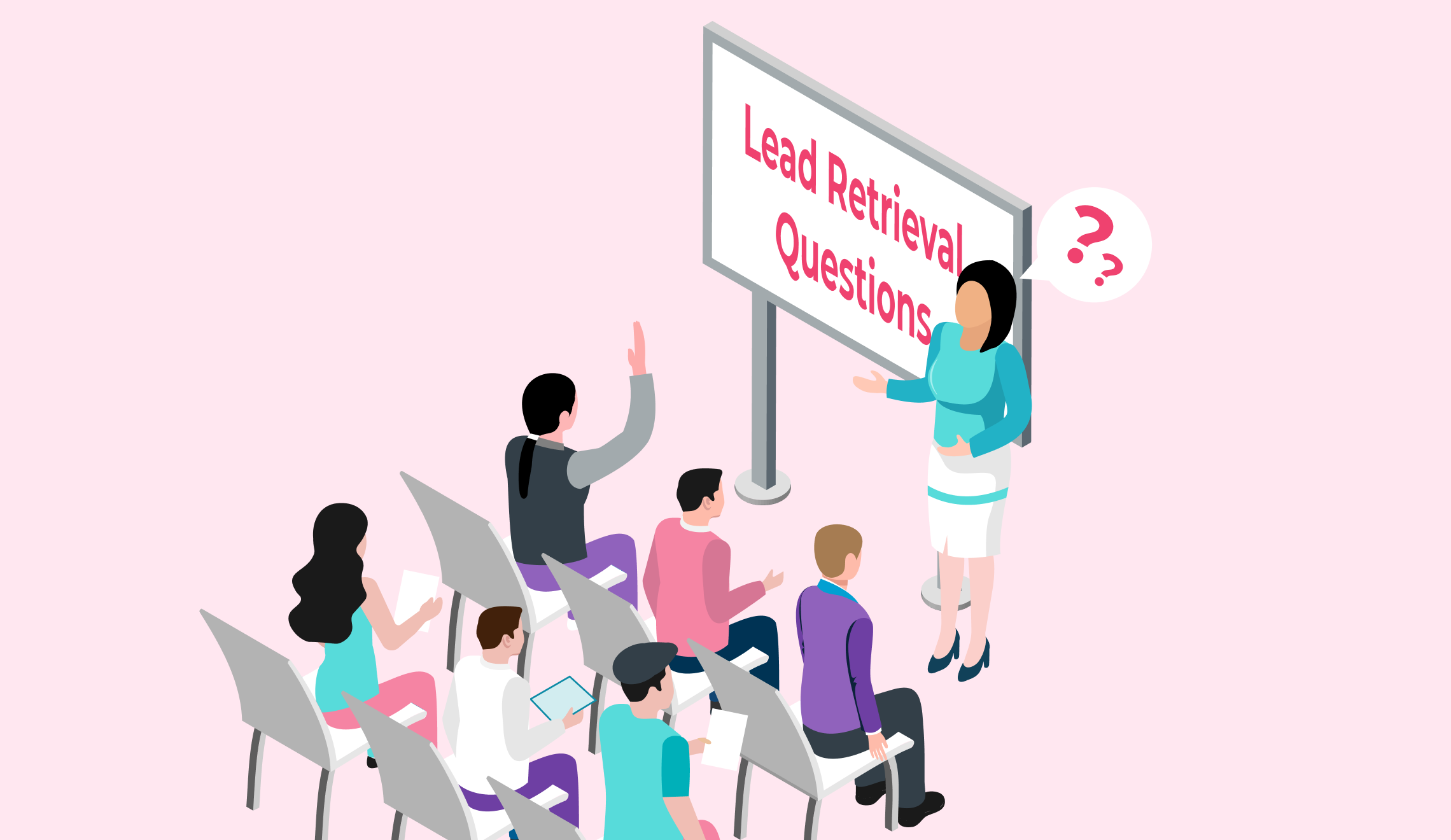Efficient Lead Retrieval Services: How to Capture Leads at Trade Shows
Trade shows offer a prime opportunity to connect with potential clients, but the effectiveness of these interactions largely depends on how well event organizers have facilitated how you capture and manage leads. Implementing efficient same-day lead retrieval strategies can dramatically improve your ability to follow up promptly and convert leads into customers. Our team has compiled the following list demonstrating how to optimize your lead retrieval process on the day of the event.
What is a lead retrieval service?
A lead retrieval service is a specialized solution used at events like trade shows, conferences, and exhibitions to capture and manage contact information from potential leads or prospects who visit a booth or attend a session. These services streamline the process of collecting and organizing leads, ensuring that valuable contact data is efficiently gathered and easily accessible for follow-up.
Key Components of Lead Retrieval Services
- Lead Capture Tools:
- Handheld Scanners: Devices used to scan badges or QR codes of attendees to quickly capture their contact details.
- Mobile Apps: Applications installed on smartphones or tablets that allow users to scan badges, input information manually, or use other methods to collect lead data.
- Real-Time Data Collection:
- Instant Data Access: The service provides immediate access to collected lead data, allowing event staff to review and act on leads as they are captured.
- Cloud-Based Storage: Data is often stored in the cloud, making it accessible from any device with internet connectivity.
- Lead Qualification and Scoring:
- Customizable Forms: Allows users to capture specific information relevant to lead qualification, such as company size, purchasing authority, or product interest.
- Real-Time Scoring: Some systems include lead scoring capabilities, helping users prioritize leads based on predefined criteria or real-time interactions.
Benefits of Lead Retrieval Services
- Efficiency: Speeds up the process of capturing and managing lead information, reducing manual data entry and minimizing errors.
- Accuracy: Ensures accurate collection of attendee data through automated scanning and real-time updates.
- Data Accessibility: Makes lead data readily accessible and easily organized, facilitating effective follow-up and lead management.
- Enhanced Engagement: Enables event staff to engage with leads more effectively by providing immediate access to lead details and interaction history.
Lead retrieval services are essential tools for maximizing the value of event participation, enabling businesses to capture, manage, and follow up with potential leads more effectively.
What is the difference between lead retrieval and lead capture?
Lead retrieval and lead capture are terms often used interchangeably, but they refer to different aspects of the process of managing potential leads at events like trade shows or conferences. Check out the differences:
Lead Capture
Definition: Lead capture refers to the initial process of collecting contact information from potential leads or prospects. This is typically the first step in gathering data about individuals who show interest in your products or services.
Key Components:
- Methods: Involves various methods such as using forms, scanning badges, collecting business cards, or having visitors enter their information into a digital system.
- Tools: May use tools like lead capture forms, mobile apps, or manual entry systems to gather basic contact details and information.
- Objective: The primary goal is to collect as much relevant data as possible from attendees who interact with your booth or attend your session.
Focus:
- Data Collection: Focuses on the process of gathering and recording information about potential leads.
- Initial Interaction: Captures the initial touch point and details of the lead, which can include name, contact details, company information, and interests.
Lead Retrieval
Definition: Lead retrieval encompasses the entire process of collecting, managing, and utilizing lead information gathered from potential prospects. It is a broader term that includes lead capture but also involves additional steps for processing and using the data effectively.
Key Components:
- Tools and Systems: Includes more sophisticated tools and systems such as lead retrieval software, CRM integrations, and data management platforms.
- Features: Often includes features for real-time data access, lead qualification, lead scoring, and analytics.
- Objective: Focuses on not only collecting lead information but also managing it efficiently and using it to drive follow-up actions and conversions.
Focus:
- Data Management: Involves organizing, analyzing, and leveraging lead data for subsequent marketing and sales efforts.
- Full Process: Encompasses the entire lifecycle of lead management from capture to follow-up, including integration with CRM systems and automated communications.
Summary of Differences
- Scope: Lead capture is a subset of lead retrieval. Lead capture is specifically about gathering initial data, whereas lead retrieval covers the entire process from capture through management and follow-up.
- Tools and Systems: Lead retrieval often involves more advanced tools and systems for managing and utilizing data, while lead capture may involve simpler methods for initial data collection.
- Objectives: Lead capture focuses on collecting information, while lead retrieval focuses on managing, qualifying, and following up on that information to maximize lead conversion and ROI.
In essence, lead capture is the initial step of gathering potential lead information, and lead retrieval encompasses the broader process of handling and utilizing that information to achieve business goals.
Why are lead retrieval systems an important part of events?
Lead retrieval solutions are crucial components of event management for several reasons. They enhance the efficiency of capturing and managing potential leads, streamline follow-up processes, and ultimately contribute to achieving business objectives. Here’s why lead retrieval systems are important:
1. Efficient Data Collection
- Streamlined Process: Lead retrieval systems automate the collection of attendee information, reducing the need for manual data entry and minimizing errors.
- Speed: They enable quick and accurate capture of lead data through scanning badges or QR codes, allowing for real-time collection and processing.
2. Enhanced Accuracy and Quality
- Minimized Errors: Automated systems reduce the likelihood of human errors that can occur with manual entry, ensuring that lead information is recorded correctly.
- Consistent Data: Standardized data capture methods ensure consistency and completeness of the information collected.
3. Real-Time Access and Management
- Immediate Data Access: Lead retrieval systems provide real-time access to lead data, allowing event staff to review and act on leads as they are captured.
- Centralized Data: Data is often stored in a centralized system, making it easier to organize, manage, and analyze.
4. Improved Lead Qualification
- Customizable Fields: Systems can be tailored to capture specific information relevant to lead qualification, such as company size, job title, and interest level.
- Lead Scoring: Some systems include lead scoring features that help prioritize leads based on predefined criteria or real-time interactions.
5. Enhanced Follow-Up and Engagement
- Timely Follow-Up: Immediate access to lead data facilitates timely follow-up actions, which can significantly improve conversion rates.
- Personalized Communication: Detailed lead information allows for more personalized and relevant follow-up communications, increasing the chances of engagement and conversion.
6. Optimized Event ROI
- Maximized Opportunities: By efficiently capturing and managing lead data, businesses can maximize the potential return on investment (ROI) from their event participation.
- Strategic Planning: Insights gained from lead data can inform future event strategies and help in making data-driven decisions.
7. Professionalism and Brand Image
- Enhanced Professionalism: Utilizing advanced lead retrieval systems reflects a high level of professionalism and preparedness, positively impacting your brand image.
- Effective Representation: A well-organized lead retrieval process demonstrates your company’s commitment to effective engagement and follow-up.
8. Scalability and Adaptability
- Scalable Solutions: Lead retrieval systems can scale to accommodate events of various sizes, from small conferences to large trade shows.
- Adaptability: They can be customized to fit different event formats and requirements, ensuring flexibility and relevance.
Lead retrieval systems play a pivotal role in events by streamlining data collection, improving accuracy, enabling real-time access and management, and enhancing follow-up and engagement. By leveraging these systems, businesses can maximize their event ROI, optimize their lead management processes, and achieve their marketing and sales goals.
Streamline Lead Collection
Leverage Digital Tools
Skip the business cards and invest in advanced digital lead retrieval tools that allow for quick and precise data capture. Modern solutions include mobile apps and handheld devices equipped with barcode scanners or QR code readers, enabling you to collect attendee information seamlessly.
Pre-Event Setup
Prepare your lead retrieval devices and software before the event starts. Ensure that all devices are fully charged, and conduct a thorough test run to confirm that they are working properly. Set up data fields in your software according to your specific needs, such as contact details, company information, and interest areas.
Implement Real-Time Data Access
Data Security
Ensure that your lead retrieval solution adheres to data protection regulations to safeguard the information collected. This is crucial to event management for maintaining attendee trust and protecting sensitive data.
Capture Detailed Information
Customizable Lead Forms
Design lead capture forms that are customizable to meet your specific requirements. Include fields for scanning essential information such as contact details, company size, decision-making authority, and specific interests or needs.
Lead Qualification
Implement real-time lead qualification criteria directly into your lead retrieval system. This helps in categorizing leads based on their potential value and engagement level, allowing your team to prioritize follow-ups effectively.
Facilitate Efficient Lead Retrieval
Team Training
Provide comprehensive training for your booth staff on using lead retrieval tools. This should include practical exercises and scenario-based training to ensure they are comfortable and efficient in capturing leads.
Role Assignment
Designate specific roles for lead retrieval and management within your team. Having dedicated personnel responsible for different aspects of lead collection and follow-up can enhance efficiency and reduce the likelihood of errors.
Real-Time Monitoring
Monitor lead retrieval activities throughout the event to ensure that processes are running smoothly. Address any issues promptly and adjust strategies as needed to optimize lead collection.
Enhance Engagement During the Event
Proactive Interaction
Encourage your booth staff to proactively engage with attendees and use lead retrieval tools during these interactions. Personalized and meaningful conversations can lead to more accurate and detailed lead data.
Interactive Elements
Incorporate interactive elements into your booth to attract and engage visitors. This can include live demonstrations, interactive displays, or gamification, which not only draws attention but also facilitates lead capture.
Follow-Up Readiness
Prepare to follow up with leads immediately after their visit to your booth. This could include sending thank-you emails, scheduling follow-up calls, or offering additional resources based on their expressed interests.
Analyze and Optimize
Ongoing Data Review
Continuously review the lead data collected throughout the event. This helps in identifying trends, assessing the effectiveness of your lead retrieval methods, and making any necessary adjustments in real-time.
Post-Event Analysis
Conduct a thorough analysis of the lead data after the event. Evaluate the quality and quantity of leads captured and assess the performance of your lead retrieval tools and strategies.
Feedback Collection
Gather feedback from your team on the lead retrieval process. Their insights can help identify any issues and provide suggestions for improvement.
Leverage Lead Retrieval Insights
Segmentation and Personalization
Use the insights gained from same-day lead retrieval to segment leads based on their interests, engagement levels, and potential value. This segmentation allows for more personalized follow-up strategies and enhances the likelihood of successful conversions.
Tailored Follow-Up
Develop follow-up strategies that are tailored to the specific needs and interests of each lead. This can include personalized emails, targeted offers, or invitations to additional events or webinars.
Continuous Improvement
Use the data and feedback collected to refine your lead retrieval process for future events. Implementing improvements based on past experiences can help increase the effectiveness of your lead capture and management strategies.
By focusing on same-day lead retrieval with Expo Logic, you can significantly enhance your ability to capture, manage, and follow up with leads promptly. Implement these strategies to maximize your trade show success and turn prospects into valuable clients.
Are you ready to optimize your lead retrieval process? Discover new strategies for capturing leads more effectively at trade shows. Learn more!


